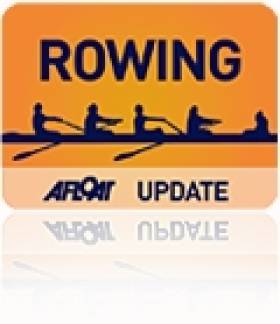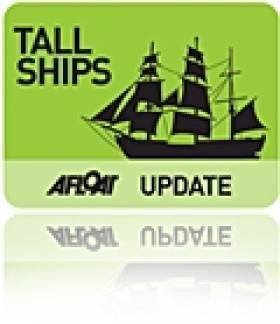Displaying items by tag: 2015
Afloat Rowers of the Year Announced
#Rowing: The Afloat Rowers of the Year for 2015 are the Ireland men’s and women’s lightweight double sculls who qualified their boats for the Olympic Games in 2016.
Claire Lambe and Sinéad Jennings needed to finish in the top 11 at the World Championships in Aiguebelette in August/September. They seemed well-placed in their semi-final to qualify for the A Final, but were pushed into fourth as Canada finished with a remarkable sprint. The Ireland crew changed tactics for the B Final, and it worked. They finished ninth.
The men’s lightweight double of Gary and Paul O’Donovan had a similar qualification mark in Aiguebelette. To have a shot they had to finish in the top three in their quarter-final, and they achieved this, pushing Hayden Cohen and Peter Taylor of New Zealand into fourth. They finished fifth in their semi-final and then booked their Rio place with a fifth-place finish (11th overall) in their B Final, eking out a place ahead of Greece, who had finished eighth at the Olympic Games in London.
Afloat wishes both crews and all the Irish rowing community the very best in 2016.
Rower of the Year Award: The judging panel is made up of Liam Gorman, rowing correspondent of The Irish Times and David O'Brien, Editor of Afloat magazine. Monthly awards for achievements during the year appeared on afloat.ie. The overall national award has been given to the crews who, in the judges' opinion, achieved the most notable results and made the most significant contribution to rowing during 2015. Keep an eye on progress in 2016.
Entry Rules For Irish Championships Changed at Rowing Ireland AGM
#RowingIrelandAGM: Delegates at the annual general meeting of Rowing Ireland in Dublin passed all the motions put before it by the board. Rowers entering the Irish Championships must now have competed at two events in Ireland; those in the high performance system will only be allowed to compete as seniors in that year. Two new, unelected, officers can be added to the board. There were also more techncial changes: the tracker system will now be the officially accepted way to do draws; the 100-metre breakages rule has been removed: fixtures submissions submitted late can be allocated a date of its choosing by the Domestic Events Committee.
At a meeting before the AGM, Morten Espersen, the Ireland high performance director, and Don McLachlan, the Ireland lead coach, made the case for changes in the domestic season which they believe would benefit the international programme.
Awards at AGM of Rowing Ireland: Connacht: Peadar O hIci; Leinster: John O’Keeffe; Munster: Dermot Wall (RIP); Ulster: Iain Kennedy. Presidents’ Award: Robert Northridge.
Fleming's K2 Fastest in Liffey Descent
#CanoeingLiffeyDescent: Neil Fleming and Robin Koenders were the fastest crew home at the 56th Liffey Descent today. In a race run in warm sunshine and light winds from Straffan to Islandbridge, the K2 of Fleming and Dutchman Koenders gained a considerable lead by Lucan over nearest challengers Gary Mawer and Barry Watkins. The winning time of one hour 48 minutes 32 seconds was outside the record for the course.
The fastest K1 paddler was Tom Brennan, winning this class for the first time, and coming home well under two hours.
Jenny Egan and her boyfriend Jon Simmons won the mixed K2. They set a new record time of one hour 53 minutes and 26 seconds.
Liffey Descent 2015 (Selected Results)
K2: 1 R Koenders, N Fleming 1 hour 48 minutes 32 seconds, 2 B Watkins, G Mawer 1:51.00, 3 L Van Riet, E Van Riet (Sth Africa) 1:51.42. Junior: C Crate, J O’Hagan 2:05.04. Master: D Halton, J Morrissey 2:02.51.
K1: 1 T Brennan 1:56.22, 2 J Boyton 1:59.38, 3 M Brennan 1:59.44. Junior: E Forristal 2:05.35.
K2 Mixed: J Simmons, J Egan 1:53.26.
Wildwater - Junior: C Clarke 2:19.16
General Purpose – Junior: 2:35.34. Masters: J Mescal 2:31.30. Veteran: E Moran 2:43.36.
Boyne Coastal Race Invites Entries
#ROWING: Coastal rowers are invited to take part in the 2015 Boyne Boat Race, over the 14 kilometre coastal, estuary and river course from Clogherhead beach to Drogheda Port on Sunday, June 21st. The Boyne Boat Race 2014 was a great success, with clubs coming from Donegal, Wexford, Wicklow and Dublin. All sorts of vessels participated, including All-Ireland craft, Pembrokeshire longboats, Slaney cots, Skiffs and Currachs to race alongside the host club’s hybrid Skiff/Australian surf boat, Bean Threasa. Craig Wolfe, the over-60s open water single scull world champion, came from Boston to row in the event. The race starts at Clogherhead beach at noon and the course runs out along the coast through the mouth of the River Boyne and winds its way up to Drogheda Port. The race time is approximately 90 minutes to two hours. The race is being held as part of Drogheda’s Maritime Festival, which runs from the 19th to 21st June.
2015 Irish Sailing Fixture List
February 23rd: RORC Caribbean 600
April 9th-12th: ISA Topper Youth Championship (Royal Cork YC)
April 25th: ISORA Coastal Day Races @ Holyhead, and Dun Laoghaire to Arklow
May 7th – 10th : ISAF Nations Cup – Euro Final (Howth YC)
May 16th: Baily Bowl (Royal Alfred YC)
May 22nd - 25th: 40th Annual Scottish Series (Clyde Cr C, Gourock-Tarbert)
May 22nd - 24th: Baltimore Wooden Boat & Seafood Festival
May 22nd-24th: ISORA Dun Laoghaire-Holyhead-Isle of Man series.
May 31st – June 1st DBOGA Leinster Trophy and Dublin Riverfest (Poolbeg Y&BC)
June 6th Howth YC Lambay Races (inc Classics)
June 12th: Dun Laoghaire to Dingle Race
June 13th: Royal Alfred YC Bloomsday Regatta (Royal StGYC)
June 24th - 28th: Kinsale: Sovereigns Regatta & ICRA Nats
June 19th – 21st Squib Irish Nats (Howth YC)
June 27th – July 3rd: Squib Inter-Nationals at Howth
July 2nd – July 5th: Tall Ships, Classics & Old Gaffers in Belfast
July 3rd RORC Lyver Trophy Holyhead-Dun Laoghaire (Royal Dee YC & ISORA)
July 9th-12th: Volvo Dun Laoghaire Regatta (inc Royal Dee YC Bicentenary Series)
July 18th – 24th: CH Marine Glandore Classics Regatta
July 22nd – 25th: WIORA Championship @ Galway Bay SC
July 31st to Aug. 2nd: Peel Traditional Boat Weekend (IOM)
Aug. 3rd: Baltimore Regatta
Aug. 4th – 7th: Calves Week (Schull)
Aug. 15th: Howth YC Double-Handed Race Challenge
Aug 15th: ISORA Dun Laoghaire to Pwllheli
Aug. 16th: Rolex Fastnet Race (Cowes)
Aug 16th – 20th Optimist Irish Nationals (Lough Derg YC)
Aug. 21st – 23rd: Crosshaven Dinghy Mini-Week
Aug. 29th: ISORA Races from Pwllheli & Dun Laoghaire to Greystones
Aug. 30th: Taste of Greystones Keelboat Regatta
Sept. 5th – 6th: DBSC Cruiser Challenge
Sept. 12th: ISORA Pwllheli to Dun Laoghaire
Sept. 12th - 13th: Helmsmans Championship
Oct. 17th : Rolex Middle Sea Race (Malta)
Belfast to Welcome Tall Ships in 2015
#TALL SHIPS - Ireland will be getting a triple dose of the Tall Ships Races this decade - after Waterford last year and Dublin next summer - as Belfast has been chosen to host the first leg of the event in 2015, BBC News reports.
Belfast City Council made the official announcement this afternoon, with Belfast Lord Mayor Niall O Donnghaile saying the return of the event in July 2015 was "another very real endorsement of Belfast's ability".
Northern Ireland's capital last hosted the tall ships in 2009, when some 800,000 visitors thronged the city to see 40 vessels in a parade of sail.
BBC News has more on the story HERE.
































































